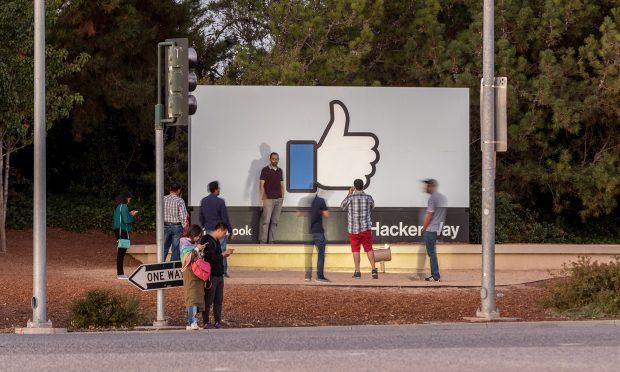In Cambridge Analytica Case, Judge Calls Out Facebook's Flip Flopping Privacy Rhetoric
“What you are saying now sounds contrary to the message that Facebook itself disseminates about privacy,” Judge Vince Chhabria told a lawyer for Facebook at a hearing Wednesday.
May 29, 2019 at 06:17 PM
4 minute read
 Headquarters for social networking company Facebook Inc. in Menlo Park, California. Photo: Jason Doiy/ALM
Headquarters for social networking company Facebook Inc. in Menlo Park, California. Photo: Jason Doiy/ALM
The federal judge overseeing the consumer privacy litigation filed against Facebook Inc. in the wake of the company's Cambridge Analytica scandal seems poised to allow at least a portion of the lawsuit to survive.
U.S. District Judge Vince Chhabria of the Northern District of California on Wednesday heard arguments on the company's motion to dismiss the mulitidistrict litigation and suggested that Facebook's lawyers were wrong to suggest that plaintiffs hold no privacy interest in information shared via social media.
Representing Facebook, Orin Snyder of Gibson, Dunn & Crutcher suggested that if a person brought together 100 friends in a room and shared information with them, there would no longer be any privacy interest in that information. “If you don't hold something private, it's not private,” said Snyder, suggesting that a Facebook user would be in a similar position as the person in the room.
Chhabria, however, pushed back against the notion that information shared via social media is devoid of privacy interest.
“If I share [something] with 10 people that doesn't eliminate my expectation of privacy,” said Chhabria “It might diminish it, but it doesn't eliminate it.”
Chhabria also noted that Snyder's argument at times ran counter to pronouncements that Facebook leaders have made before regulators and to the public of late about the importance of user privacy. “What you are saying now sounds contrary to the message that Facebook itself disseminates about privacy,” the judge told Snyder.
Later in the hearing, plaintiffs co-lead counsel Derek Loeser of Keller Rohrback echoed that sentiment.
“I think we all should have a lot of concern and take pause when Mr. Synder says that there is no expectation of privacy when a person uses Facebook,” said Loeser, who is representing the plaintiffs alongside Lesley Weaver of Bleichmar Fonti & Auld.
Facebook was hit with lawsuits alleging that the company violated consumer fraud and privacy laws by allowing third parties to access user data without consent or in ways previously undisclosed by the company. The multidistrict litigation was consolidated before Chhabria in June 2018 after revelations that the now-defunct Cambridge Analytica data analytics firm used data from 87 million Facebook users to develop targeted political ads.
Facebook has conceded Cambridge Analytica obtained personal information about users through a Facebook app called “thisisyourdigitallife,” created by developer Aleksandr Kogan. The social media company contends that Kogan and Cambridge Analytica violated Facebook's internal policies.
Arguing Wednesday for Facebook, Snyder cautioned that “It's not up to the federal district court to invent new privacy rights.” He said that the company made a “multiplicity of disclosures to users” that they could control who had access to information shared via their Facebook profiles via the site's privacy and app settings. Snyder argued that any reasonable Facebook user would have known that third-party app developers could get access to certain information about them via their friends' Facebook activity through reviewing the company's disclosures.
“Users had the absolute right to control who saw what,” Snyder said. “To the extent that Facebook made that privacy declaration, Facebook scrupulously followed it.”
Chhabria said that he tended to agree with Snyder's interpretation of the Facebook disclosures, but pointed out that he was reading them with the benefit of hindsight as someone who has been following developments in the media in the wake of the Cambridge Analytica news. Chhabria said that he likely needed to look at the disclosure language through the eyes of a Facebook consumer in 2012. “Am I really in a position at this point to conclude from all these worlds that the FB user who signed up in 2012 could only interpret this language in the way you're suggesting?” asked Chhabria, noting that the suit was only at the motion to dismiss stage.
The judge took the matter under the submission without indicating when he would rule.
This content has been archived. It is available through our partners, LexisNexis® and Bloomberg Law.
To view this content, please continue to their sites.
Not a Lexis Subscriber?
Subscribe Now
Not a Bloomberg Law Subscriber?
Subscribe Now
NOT FOR REPRINT
© 2025 ALM Global, LLC, All Rights Reserved. Request academic re-use from www.copyright.com. All other uses, submit a request to [email protected]. For more information visit Asset & Logo Licensing.
You Might Like
View All
K&L Gates Files String of Suits Against Electronics Manufacturer's Competitors, Brightness Misrepresentations
3 minute read
California Court Denies Apple's Motion to Strike Allegations in Gender Bias Class Action

White & Case KOs Claims Against Voltage LLC in Solar Companies' Trade Dispute

Trending Stories
- 1Data Disposition—Conquering the Seemingly Unscalable Mountain
- 2Who Are the Judges Assigned to Challenges to Trump’s Birthright Citizenship Order?
- 3Litigators of the Week: A Directed Verdict Win for Cisco in a West Texas Patent Case
- 4Litigator of the Week Runners-Up and Shout-Outs
- 5Womble Bond Becomes First Firm in UK to Roll Out AI Tool Firmwide
Who Got The Work
J. Brugh Lower of Gibbons has entered an appearance for industrial equipment supplier Devco Corporation in a pending trademark infringement lawsuit. The suit, accusing the defendant of selling knock-off Graco products, was filed Dec. 18 in New Jersey District Court by Rivkin Radler on behalf of Graco Inc. and Graco Minnesota. The case, assigned to U.S. District Judge Zahid N. Quraishi, is 3:24-cv-11294, Graco Inc. et al v. Devco Corporation.
Who Got The Work
Rebecca Maller-Stein and Kent A. Yalowitz of Arnold & Porter Kaye Scholer have entered their appearances for Hanaco Venture Capital and its executives, Lior Prosor and David Frankel, in a pending securities lawsuit. The action, filed on Dec. 24 in New York Southern District Court by Zell, Aron & Co. on behalf of Goldeneye Advisors, accuses the defendants of negligently and fraudulently managing the plaintiff's $1 million investment. The case, assigned to U.S. District Judge Vernon S. Broderick, is 1:24-cv-09918, Goldeneye Advisors, LLC v. Hanaco Venture Capital, Ltd. et al.
Who Got The Work
Attorneys from A&O Shearman has stepped in as defense counsel for Toronto-Dominion Bank and other defendants in a pending securities class action. The suit, filed Dec. 11 in New York Southern District Court by Bleichmar Fonti & Auld, accuses the defendants of concealing the bank's 'pervasive' deficiencies in regards to its compliance with the Bank Secrecy Act and the quality of its anti-money laundering controls. The case, assigned to U.S. District Judge Arun Subramanian, is 1:24-cv-09445, Gonzalez v. The Toronto-Dominion Bank et al.
Who Got The Work
Crown Castle International, a Pennsylvania company providing shared communications infrastructure, has turned to Luke D. Wolf of Gordon Rees Scully Mansukhani to fend off a pending breach-of-contract lawsuit. The court action, filed Nov. 25 in Michigan Eastern District Court by Hooper Hathaway PC on behalf of The Town Residences LLC, accuses Crown Castle of failing to transfer approximately $30,000 in utility payments from T-Mobile in breach of a roof-top lease and assignment agreement. The case, assigned to U.S. District Judge Susan K. Declercq, is 2:24-cv-13131, The Town Residences LLC v. T-Mobile US, Inc. et al.
Who Got The Work
Wilfred P. Coronato and Daniel M. Schwartz of McCarter & English have stepped in as defense counsel to Electrolux Home Products Inc. in a pending product liability lawsuit. The court action, filed Nov. 26 in New York Eastern District Court by Poulos Lopiccolo PC and Nagel Rice LLP on behalf of David Stern, alleges that the defendant's refrigerators’ drawers and shelving repeatedly break and fall apart within months after purchase. The case, assigned to U.S. District Judge Joan M. Azrack, is 2:24-cv-08204, Stern v. Electrolux Home Products, Inc.
Featured Firms
Law Offices of Gary Martin Hays & Associates, P.C.
(470) 294-1674
Law Offices of Mark E. Salomone
(857) 444-6468
Smith & Hassler
(713) 739-1250






